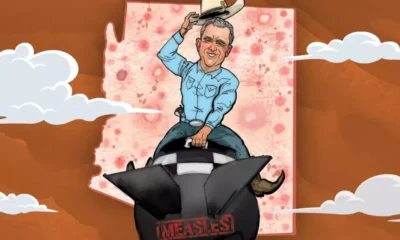Business
Surge in Measles Misinformation: Americans Are Listening, Survey Reveals

The current measles epidemic, marking the most significant outbreak in a decade, has resulted in the tragic deaths of two children and has spread across 27 states. Amidst growing concerns, public perception regarding the safety of the measles vaccine is sharply divided, largely influenced by anti-vaccine sentiments from prominent health officials.
A recent KFF survey indicates that approximately two-thirds of parents aligned with the Republican Party remain uninformed about the rise in measles cases this year. In contrast, about two-thirds of Democratic parents are aware of the situation. The study, which involved 1,380 U.S. adults, highlights that Republicans exhibit greater skepticism towards vaccines, with one in five believing the measles vaccine is more harmful than the disease itself, compared to one in ten Democrats.
This trend mirrors findings from a previous KFF survey conducted in June 2023. However, this current poll reveals that nearly 30% of parents mistakenly think vitamin A can prevent measles, a notion propagated by Health and Human Services Secretary Robert F. Kennedy Jr. since the outbreak began. Currently, at least 900 cases have been reported, predominantly stemming from an outbreak in West Texas.
“The most alarming aspect is the growing number of individuals who are encountering these misleading claims,” remarked Ashley Kirzinger, associate director of KFF’s Public Opinion and Survey Research Program. She emphasized that while belief in the autism-link theory isn’t increasing significantly, awareness is spreading, which could diminish vaccination rates among children.
Kelly Moore, president and CEO of Immunize.org, noted that confusion arises from contradictory messages delivered by individuals in power. Scientific consensus has long established that there is no connection between vaccines and autism, yet Kennedy has initiated an investigation into potential environmental factors contributing to autism, vowing to provide insights by September.
The persistent skepticism among Republicans complicates the task of disseminating accurate information across many regions in the U.S. Rekha Lakshmanan, chief strategy officer at The Immunization Partnership, pointed out that lawmakers with medical backgrounds in southern states like Texas and Oklahoma tend to resist public health initiatives. “There’s a political element that affects these politicians,” she stated, highlighting how inviting vaccine opponents to testify further disseminates misinformation.
Eric Ball, a pediatrician in California, reflected on the impact of previous outbreaks. A measles outbreak from 2014-2015 traced back to Disneyland saw his practice confront serious health threats. “Vaccine effectiveness leads to complacency,” he said, stressing that it takes severe consequences for communities to acknowledge the necessity of vaccination. His experiences led to a policy change in his practice to avoid unvaccinated patients after witnessing firsthand the dangers of measles exposure.
Despite the mortality of two otherwise healthy young girls during the Texas outbreak, many are still not adequately fearful of the disease. Paul Offit, director of the Vaccine Education Center at Children’s Hospital of Philadelphia, noted an uptick in parental inquiries about vaccinating infants. Typically, the first measles shot is administered at one year, as immunity may not fully develop if given earlier.


















